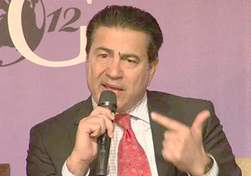
WASHINGTON: The U.S.-India Business Council (USIBC) has applauded the Indian government's latest reforms liberalising FDI norms in industries that are starved for capital and enable the ease of doing business in the country. "Putting more FDI proposals through the automatic route is clear signal that the government is living up to the mandate of minimum government and maximum governance," USIBC president...

Dr. Mukesh Aghi said. USIBC comprises 350 top-tier U.S. and Indian companies. "India's recent rise in World Bank's Ease of Doing Business, the ruling on Minimum Alternative Tax (MAT), its efforts to modernise the railways network, lifting of FDI in the insurance sector are all significant achievements that will propel more investment and innovation in the country," he said.
"USIBC member companies are encouraged by the Government's efforts to undertake economic reforms and stay away from politically driven distractions." "India continues to see increased FDI despite an uncertain global outlook. If the government continues on the current trajectory of bold (FDI and regulatory) reforms, then India will easily surpass the $41 billion in FDI from U.S. companies," Aghi said. During Prime Minister Narendra Modi's visit to Washington in Sep 2014, USIBC had identified upwards of $41 billion slated for investment from members over the next three years, based on a survey of 20 percent of USIBC's membership. Emphasizing the benefit of a more open economy, Aghi said, "Allowing a path to relax the norms for sourcing for single brand retailers who sell cutting edge technology will clear many of the challenges that high-tech companies have had when it comes to taking advantage of the 100 percent opening of the single brand retail sector."
"In construction development, removal of two major conditions on minimum requirements area restriction of 20,000 sq. m. and capitalisation of U.S.$ 5 million will provide much-needed boost to investment in the real estate development sector."
The Council is keen on further reforms in these sectors and additional liberalisation that will aid the growth of bilateral trade, Aghi added, "FDI in business to e-commerce still remains restricted. As a result, smaller Indian e-commerce companies cannot seek the capital they need to grow their business and hire more employees. USIBC will continue to urge the Department of Industrial Policy & Promotion (DIPP) to allow at least 51 percent FDI in e-commerce," he said.
"USIBC member companies are encouraged by the Government's efforts to undertake economic reforms and stay away from politically driven distractions." "India continues to see increased FDI despite an uncertain global outlook. If the government continues on the current trajectory of bold (FDI and regulatory) reforms, then India will easily surpass the $41 billion in FDI from U.S. companies," Aghi said. During Prime Minister Narendra Modi's visit to Washington in Sep 2014, USIBC had identified upwards of $41 billion slated for investment from members over the next three years, based on a survey of 20 percent of USIBC's membership. Emphasizing the benefit of a more open economy, Aghi said, "Allowing a path to relax the norms for sourcing for single brand retailers who sell cutting edge technology will clear many of the challenges that high-tech companies have had when it comes to taking advantage of the 100 percent opening of the single brand retail sector."
"In construction development, removal of two major conditions on minimum requirements area restriction of 20,000 sq. m. and capitalisation of U.S.$ 5 million will provide much-needed boost to investment in the real estate development sector."
The Council is keen on further reforms in these sectors and additional liberalisation that will aid the growth of bilateral trade, Aghi added, "FDI in business to e-commerce still remains restricted. As a result, smaller Indian e-commerce companies cannot seek the capital they need to grow their business and hire more employees. USIBC will continue to urge the Department of Industrial Policy & Promotion (DIPP) to allow at least 51 percent FDI in e-commerce," he said.

 RSS Feed
RSS Feed
